More than a century before Apti Aluadinov, Chechnya’s deputy interior minister and a commander of its police forces, told out ABC reporter James Longman last month the same thing that Head of the Chechen Republic Ramzan Kadyrov has said, that there are no gays in their country; more than a century before Bishop Godfrey Makumbi of the West Buganda Diocese of the Church of Uganda said in 2012 there are no gays in Uganda; more than a century before then-President of Iran Mahmoud Ahmadinejad said in 2007 there aren’t as many gays in his country as the United States, various countries were claiming that homosexuality was something that only existed beyond their borders.
And homophobia was weaponized during wartime, such as in this WWI French postcard in which the dancing men in tutus being mocked represented Austrian Emperor Franz Joseph and German Kaiser Wilhelm II.
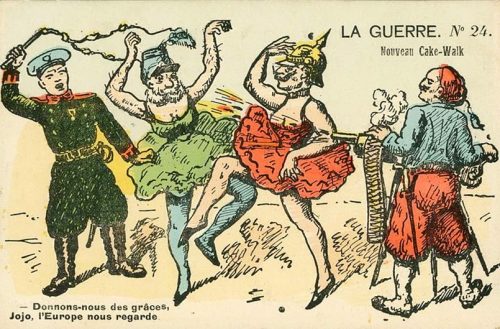
Related: This out bisexual singer reigned as Empress of the Blues in the 1920’s
Associating homosexuality with Germany was so common in France around the turn of the 20th century that one way French gays discretely identified each other was asking, “Parlez-vous allemand?” – “Do you speak German?”
Never Miss a Beat
Subscribe to our newsletter to stay ahead of the latest LGBTQ+ political news and insights.
The connection dated to at least the late 19th century as evidenced by the 1896 novel Les Invertis (Le Vice Allemand) – The Inverts (The German Vice) by Armand Dubarry, a prolific writer of several genres.
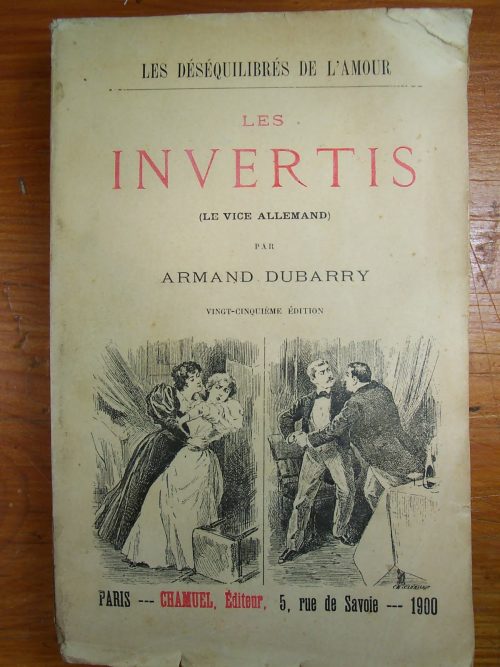
Following German psychiatrist Richard von Krafft-Ebing’s 1886 Psychopathia Sexualis which focused on a number of “sexual pathologies,” particularly homosexuality, it was the second in his 12 pseudoscientific, psychopathological romans à l’eau de rose (romance or trash) novels he called, Les déséquilibres de l’amour (The Lunatics of Love). Extremely popular, they went through several printings and were translated into other languages.
The book’s central figures are not just “inverts” but also brother and sister, “loathsome and decadent aristocrat” Adolphe de Champlan and masculine Florine, the Baronne de Morangis, “a woman with a suspiciously downy upper lip” – who preys on “normal” heterosexual, virginal Claire, betrothed against her will to Adolphe, and her “normal” true love, virginal, hardworking but impoverished, Georges.
“The marriage between poor Claire and the evil, effeminate count takes place as scheduled but, not surprisingly, is never consummated. Instead, her new husband launches an all-out assault on the virtue of her beloved Georges, while Claire’s sister-in-law assails her chastity with equal fervor. In the end the beleaguered young lovers are forced to flee to Switzerland to escape the clutches of their depraved admirers. Adolphe and Florine pursue them across the Alps, but come to a hideous end when they are, first, trapped by an avalanche and then torn to pieces by a pair of eagles pointedly described as heterosexual.” – Erin G. Carlston, “German Vices: Sexual/Linguistic Inversions in Fin de Siècle France,” The Romantic Review.
Each novel in the series also contained a Dubarry “medical” discourse. In Les invertis he wrote: “Pederasty refuses the light. [It is] ignoble [and] held in contempt. It can only subsist in the shadows and requires secrecy” and claims that the German military is permeated with “pederasty.” Recalling allegedly witnessing German soldiers pillage a train store during the Franco-Prussian War, he asserts that his beloved France was overrun by sodomites.
He also claimed that, with Germany, England was leading the “European pederast movement.” Ironically, elements in Great Britain came to join Dubarry and other Frenchmen in equating Germany with homosexuality.
The sensational 1907 Harden-Eulenburg affair in which cabinet members and confidants of the Kaiser were publicly accused of being gay reinforced this naive concept and was a welcome distraction in England from the lingering stink of the Oscar Wilde trials.
Then, during WWI, a ruthless, ambitious member of the British Parliament named Noel Pemberton Billing who could have given any contemporary American Antigay Industry lunatic a run for his or her demagogic money, published an article (allegedly written mostly by his assistant editor) called “The Forty-Seven Thousand” which referred to “47,000 highly placed British perverts” being blackmailed by the Germans to “propagate evils which all decent men thought had perished in Sodom and Lesbia.”
There exists in the Cabinet Noir of a certain German Prince a book compiled by the Secret service from reports of German agents who have infested this country for the past 20 years, agents so vile and spreading such debauchery and such lasciviousness as only German minds can conceive and only German bodies execute. [And] there had been many persons who had been prevented from putting their full strength into the war by corruption and blackmail and fear of exposure. [I]ncestuous bars were established in Portsmouth and Chatham. In these meeting places the stamina of British sailors was undermined. More dangerous still, German agents, under the guise of indecent liaison, could obtain information as to the disposition of the Fleet . . . . In this black book of sin details were given of the unnatural defloration of children who were drawn to the park by summer evening concerts. . . .Wives of men in supreme position were entangled. In Lesbian ecstasy the most sacred secrets of State were betrayed. The sexual peculiarities of members of the peerage were used as a leverage to open fruitful fields for espionage.
Lesbian-but-not-publicly-out dancer/actress Maud Allan unsuccessfully sued him for libel when he wrote that she was a member of the alleged 47,000 and “the Cult of the Clitoris” after she played Salome in a dance variation on Wilde’s play. See Sisters of Salome by Toni Bentley for more details of Allan’s lawsuit.
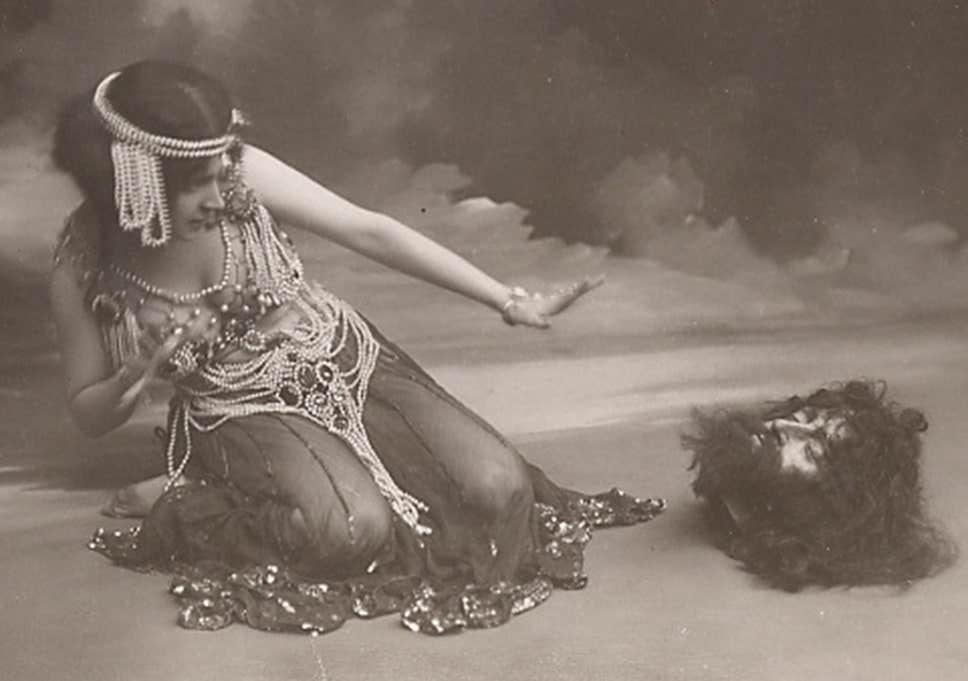
Once again demonstrating what a worm he was, no less than Lord Alfred “Bosie” Douglas, Oscar Wilde’s former lover and the cause of his disgrace and ultimate imprisonment by pressuring Wilde to sue his father for libel, testified for Billing. Eager to get even with gays who’d denounced or shunned him for betraying Oscar, Douglas had earlier played his own direct role in fanning wartime homophobia by writing a pamphlet that sold thousands of copies: “Two foes thou hast, one there one here, One far one ultimately near, Two filthy fogs blot out thy light: The German, and the Sodomite.” At the trial, he praised Billing for trying to save Great Britain from people like Wilde – “a diabolical influence on everyone he met” and “the greatest force for evil that has appeared in Europe during the last 350 years.”

Another even more sensational trial involved Irish native Roger Casement, once a hero for his reports on hideous colonial human rights abuses in the Congo and Peru, who had been knighted by King George V for his advocacy for Amazonian Indians. He was tried for treason for allying himself with Britain’s enemy Germany during WWI in hopes they would provide arms and free Irish prisoners of war for the fight for Irish independence during the 1916 Easter Rebellion, facts he admitted to.
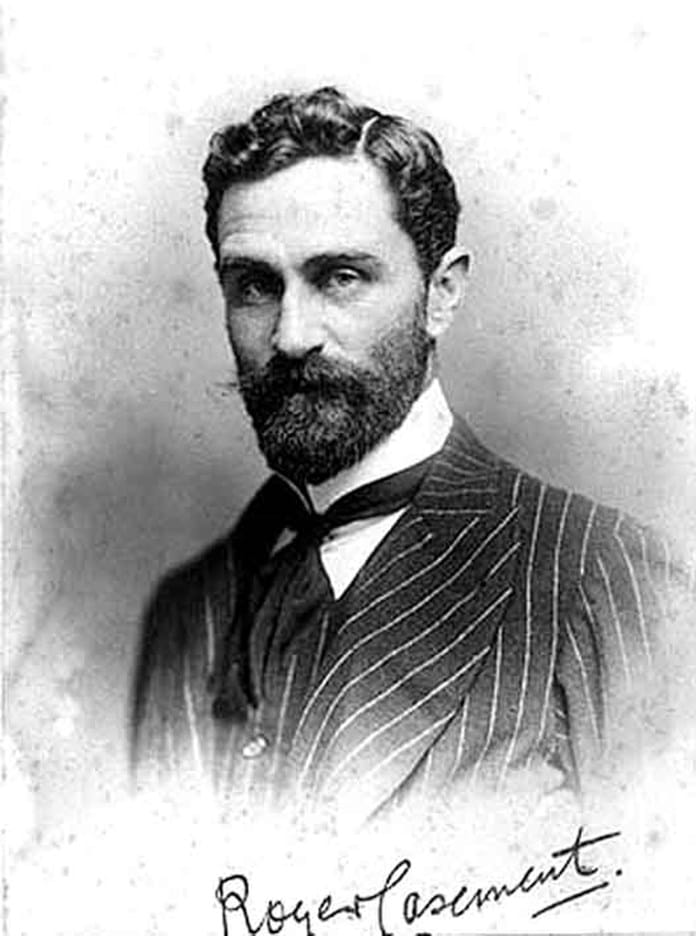
In his opening statement, prosecutor Lord Frederick Birkenhead said: “The treason which is charged against the prisoner is the treason which consists of adherence to the King’s enemies in the enemy country, and in relation to that treason evidence will be given to you of many overt acts; of the attempt to seduce, and in some cases the actual seduction of His Majesty’s soldiers from loyal allegiance to His Majesty.”
In his closing statement, he said: “We are now in a position to connect this landing [of a German vessel on the shores of Ireland] quite simply, quite clearly, and quite inevitably with the acts of seduction and the treasonous plans which were outlined in Germany.” [“Illumination: the Undergraduate Journal of Humanities: Spring 2006”]
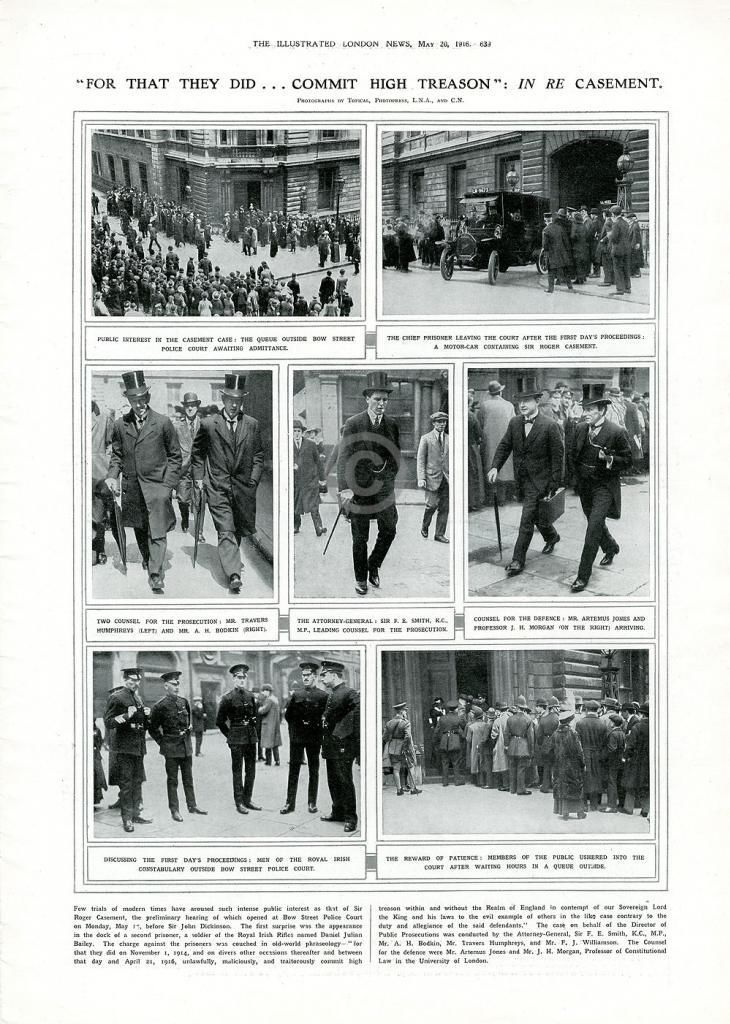
Allegedly, along with diaries of his years of humanitarian work, Casement had written extensive, explicit diaries of his many and favorite same-sex encounters with various locals in the countries he investigated. Alleged typed transcripts of some of the alleged diaries’ most lurid passages were distributed by the government to counteract pleas for clemency by a legion of notables including Sherlock Holmes creator Sir Arthur Conan Doyle, poet W. B. Yeats, and playwright George Bernard Shaw.
English poet Alfred Noyes, working as a wartime propagandist for the Foreign Office, wrote: “’I have seen and read them and they touch the lowest depths that human degradation has ever touched. Page after page of his diary would be an insult to a pig’s trough to let the foul record touch it.”
Found guilty, Casement was hanged on August 3, 1916, the last of 16 executed for their roles in the Easter rebellion. In 1965 his body was repatriated to Ireland where a huge state funeral attended by tens of thousands was held, and he was further honored with a postage stamp there in 1966.
For decades many believed (and some still do) that, whatever else he was, Casement wasn’t gay, and that the British government had forged the diaries to further vilify him in the public’s mind including Irish Catholics.
Some family and friends vehemently denied he was gay at all, as did some born after his death such as late Irish author and civil servant Eoin Neeson who wrote: “No one who knew him believed the allegations and [they] are unanimous about his extremely high sense of moral integrity… The virtual impossibility of his practicing the gross degeneracies at all, let alone with the frequency alleged, is demonstrable.”
The results of a 2002 independent forensic examination concluded that “each of the five documents collectively known as the Black Diaries is exclusively the work of Roger Casement’s hand, without any reason to suspect either forgery or interpolation by any other hand.”
Neeson was one of those who accepted the conclusion but expressed fear that “Casement would be portrayed as some kind of homosexual icon rather than the great man he was.”
His sad homophobia aside, gay icon is exactly what longtime Irish gay activist Jeffrey Dudgeon believes Casement is. In 1981, Dudgeon successfully challenged Northern Ireland’s law against consensual adult homosexual acts before the European Court of Human Rights which ruled that it violated the European Convention of Human Rights. That led the next year to decriminalization in Northern Ireland by the British government in 1982. England, Wales, and Scotland had already passed similar laws.
Some evidence of what might be called today “sexual tourism” aside, Dudgeon noted: “It has to be said that the diaries, as well as being an important part of Irish history, are also a vital part of gay history in the twentieth century. They are the only body of written evidence of intense gay sexual detail from this time.”
In 1999, he discovered a letter written by a British secret service agent to his superior four days before Casement was hanged identifying a lover Casement had referred to as “Millar” over several years in the diaries as 26-year old Joseph Millar Gordon, an employee of the Belfast Bank. Dudgeon argues that as such a letter would have been secret there would have been no purpose for the British government to forge it, too.
Conversely, Angus Mitchell has argued for years that the diaries were faked by the government to defame Casement and quiet those opposed to his hanging. “I contest the authenticity of the Black Diaries not because I doubt that Casement was gay, but because I don’t accept that he would have left such self-incriminating evidence to be so conveniently discovered.”
But Mitchell’s assertion that “Dudgeon upheld the diaries as the heart and soul of Casement’s biography and used them provocatively as a means of destabilizing (or queering) the martial spirit of Northern Irish Protestant nationalism and representing it as some deviant youth movement” smells of the same kind of homophobia Neeson exhibited but Mitchell denies.
In any case, his assertion that “In 1916, homosexuality was still punishable under English law by execution” seriously impacts his credibility given sodomy stopped being a capital crime with enactment of the Offenses against the Person Act of 1861.
A much lengthier, detailed, and documented deconstruction of Mitchell by Dudgeon can be read here.
On a much lighter note, in more than one way homophilia danced with war, too. As they did in their professional approach to every other aspect of life, decades before the Village People’s double-entendre “In the Navy,” gay brother illustrators JC and Frank Leyendecker brought their “hide in plain sight” and naked phallic symbolism that might make Freud blush to their work during WWI, from official recruiting posters to magazine covers to advertising for men’s clothes.
Terence Denman’s description of “Ireland’s Unknown Soldiers,” quoted in Tommy: The British Soldier on the Western Front 1914-1918, could serve as descriptions of some of the brothers’ illustrations, too: “Gunners stripped and sweating, each crew working like a machine, the swing and smack of the breech blocks as clean and sweet as a kiss, and a six-foot stream of flame from the muzzle, a thunderclap of sound, and away tore the shell over the hills to the Boche trenches 5,000 yards away.”
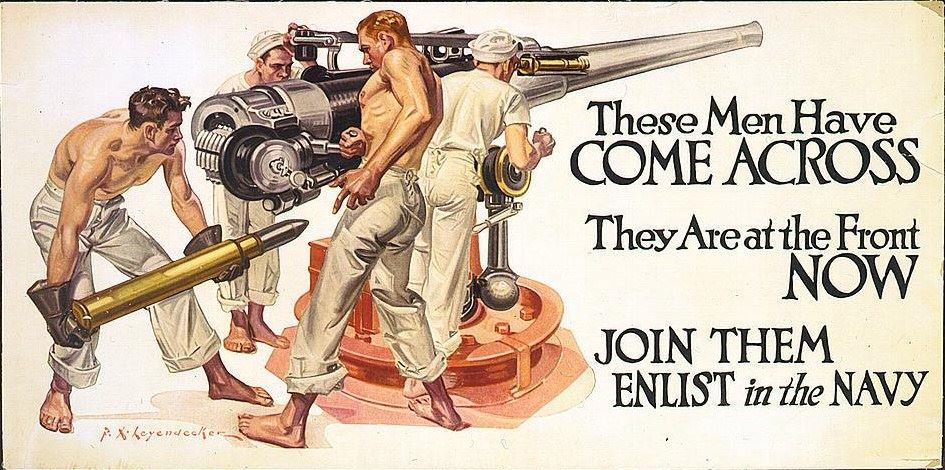
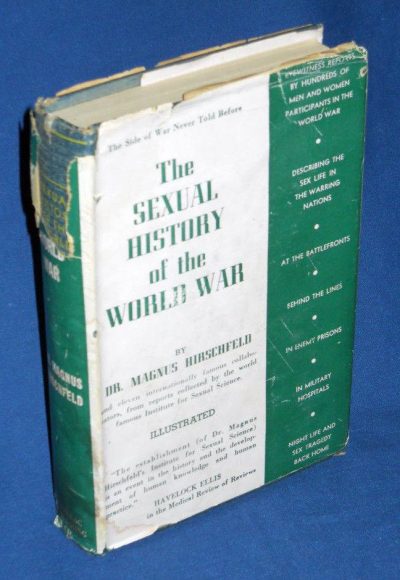 Finally, in The Sexual History of the World War, with “eyewitness reports by hundreds of men and women participants in the World War; describing the sex life in the warring nations,” Germany’s legendary sexologist and cofounder of the world’s first gay rights organization Magnus Hirschfeld wrote: “The assumption that the consciously erotic form of comradeship was not infrequent is the more justified since there are reports of a not inconsiderable number of such cases between soldiers of the same rank as well as between soldiers and officers.”
Finally, in The Sexual History of the World War, with “eyewitness reports by hundreds of men and women participants in the World War; describing the sex life in the warring nations,” Germany’s legendary sexologist and cofounder of the world’s first gay rights organization Magnus Hirschfeld wrote: “The assumption that the consciously erotic form of comradeship was not infrequent is the more justified since there are reports of a not inconsiderable number of such cases between soldiers of the same rank as well as between soldiers and officers.”
Parlez-vous allemand?
Don't forget to share:















